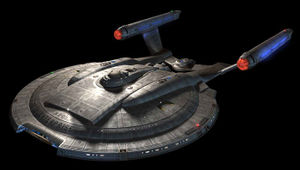| USS Genesis (NAR-29) | ||||||||||||||||||

| ||||||||||||||||||
| USS Genesis (NAR-29) | ||||||||||||||||||
| ||||||||||||||||||
The USS Genesis, an NX Class starship commissioned in 2375, operates as a temporal investigation vessel for Solas Tempus. With its advanced temporal technology and specialty systems, including the Temporal Interdiction Field and Quantum Resonance Detection, the ship is capable of detecting and preventing unauthorized temporal travel while analyzing quantum resonances associated with temporal disturbances and alternate realities. Under the command of Captain Leonard Jeffries Baxter, the vessel's skilled crew navigates the complexities of time under the guidance of Executive Officer Commander Jane Jamison. Science Officer Commander Max Renton leads the scientific team in unraveling the mysteries of temporal anomalies, while Chief Engineer Captain Indigo Lobo ensures the ship's systems are operating at peak efficiency. Together, they embark on covert operations and temporal investigations, safeguarding the timeline and preserving the interests of Solas Tempus.
Special Capabilities
- Temporal Interdiction Field
- A defensive system that creates a localized field capable of disrupting or preventing unauthorized temporal travel.
- Quantum Resonance Detection
- The array's sensitive sensors can detect even the faintest quantum resonances, capturing the minute energy signatures associated with temporal disturbances or alternate realities.
Security Forces
History
The USS Genesis was commissioned in 2375 as a temporal investigation vessel, initially assigned to Starbase Tranquility. Its primary mission was to explore and investigate temporal anomalies within a designated sector of space. Equipped with state-of-the-art temporal technology, the Genesis quickly gained a reputation for its successful resolution of temporal incidents.
From 2375 to 2381, the Genesis operated under Solas Tempus, working closely with the Department of Temporal Investigations (DTI) to maintain the integrity of the timeline and prevent any temporal disruptions. The ship's crew honed their skills in temporal mechanics and anomaly detection during this time, establishing themselves as experts in their field.
In 2381, recognizing the ship's exceptional track record and capabilities, Solas Tempus made the decision to transfer the USS Genesis to Starbase Pandora. This transfer marked a shift in the ship's mission profile from solely temporal investigations to include covert operations, both conventional and temporal in nature.
Starbase Pandora, a classified Solas Tempus facility, served as an ideal base for the USS Genesis due to its expertise in temporal research and its ability to handle sensitive operations. The starbase's unique resources and infrastructure allowed the ship and its crew to operate autonomously while conducting their investigations and covert operations.
As part of Starbase Pandora's covert operations division, the USS Genesis became involved in highly classified missions that required a blend of temporal expertise, intelligence gathering, and conventional tactics. The ship's ability to navigate through time and space and its experienced crew made it an invaluable asset for Solas Tempus in dealing with temporal threats and other covert operations that could impact the organization's mission.
Over time, the USS Genesis developed a reputation for its successful handling of delicate and dangerous missions, earning the respect of its allies and the fear of its adversaries. The ship's crew, under the capable command of Captain Leonard Jeffries Baxter, became known for their adaptability, resourcefulness, and dedication to protecting the timeline and the interests of Solas Tempus.
As the USS Genesis continues its operations under Starbase Pandora, it remains at the forefront of investigating temporal incidents and covert operations, striving to safeguard the integrity of time and the security of Solas Tempus against any potential threats, both from within and beyond the boundaries of known space.